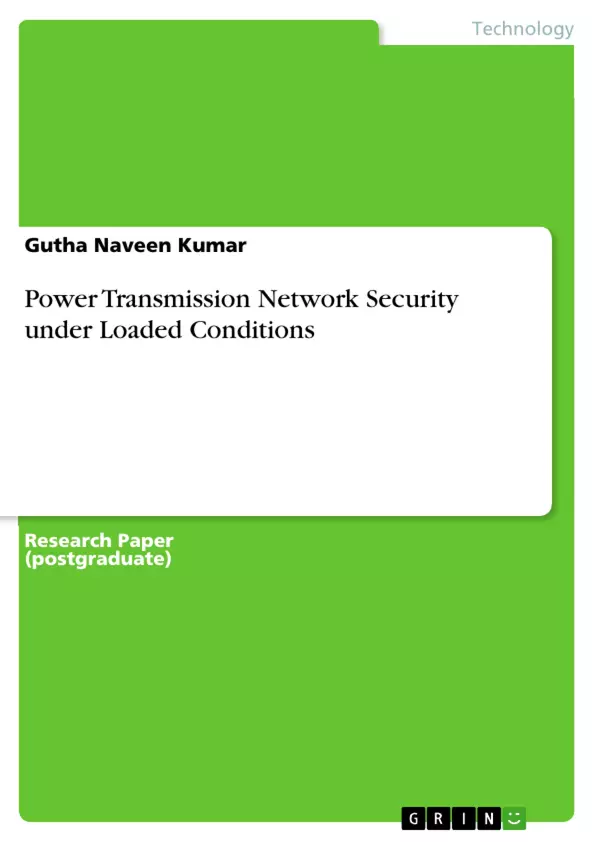A lot of research has happened in Electrical Engineering in the field of Power Engineering with regards to Power System Stability and related issues. The research work presented as part of this book only adds to this multitude of findings in the area of Load Modelling which plays an important role in Voltage Stability Analysis. We addressed the Voltage Instability issues arising in the presence of Polynomial Loads with Computational Intelligence as a tool to solve this issue.
Inhaltsverzeichnis (Table of Contents)
- PREFACE
- ACKNOWLEDGEMENTS
- CHAPTER 1
- INTRODUCTION
- 1.1 Background of work proposed
- 1.2 Definitions of Voltage Stability
- 1.2.1 Definitions according to CIGRE
- 1.2.2 Definitions according to Hill and Hiskens
- 1.2.3 Definitions according to IEEE
- 1.3 Literature Survey
- 1.4 Overview of work presented in the book
- CHAPTER 2
- PROBLEM DEFINITION
- 2.1 Problem formulation and Approach
- 2.2 What is Voltage Instability Problem
- 2.3 Causes of Voltage Instability
- 2.4 Workflow
- CHAPTER 3
- MODEL AND COMPONENT DESCRIPTION
- 3.1 IEEE 14 Bus Power System Network
- 3.2 Polynomial Loads
- 3.3 Static Var Compensator
- 3.4 Static Synchronous Compensator
- CHAPTER 4
- SOFTWARE FLOW ROUTINE
- 4.1 Binary Search Algorithm
- 4.2 Fast Decoupled Load Flow Approach
- 4.3 Power System Analysis Toolbox
- CHAPTER 5
- RESULTS AND ANALYSIS
- 5.1 Analysing the load models
Zielsetzung und Themenschwerpunkte (Objectives and Key Themes)
This book aims to contribute to the body of research on power system stability, specifically focusing on voltage stability issues related to polynomial loads in power systems. It utilizes computational intelligence techniques to address these challenges.
- Voltage stability analysis
- Polynomial load models
- Computational intelligence techniques
- Power system stability
- Impact of load modeling on voltage stability
Zusammenfassung der Kapitel (Chapter Summaries)
- Chapter 1 provides a general overview of voltage stability, including definitions and background information. It also presents a literature review and outlines the scope of the book.
- Chapter 2 delves into the problem definition, outlining the challenges posed by voltage instability, particularly in the presence of polynomial loads. It introduces the research approach and methodology employed in the study.
- Chapter 3 focuses on the models and components used in the analysis, including the IEEE 14 Bus Power System Network, polynomial load models, and reactive power compensation devices like Static Var Compensator (SVC) and Static Synchronous Compensator (STATCOM).
- Chapter 4 discusses the software flow routine used in the study, including the binary search algorithm, fast decoupled load flow approach, and the Power System Analysis Toolbox.
- Chapter 5 presents the results and analysis obtained from the study, focusing on analyzing the behavior of different load models and the impact of reactive power compensation on voltage stability.
Schlüsselwörter (Keywords)
The book focuses on key terms and concepts like voltage stability, polynomial loads, power system stability, computational intelligence, reactive power compensation, and load modeling. It analyzes the impact of these factors on voltage stability in power systems.
Frequently Asked Questions
What is the focus of this research in Power Engineering?
The book focuses on Power System Stability, specifically Voltage Stability Analysis and the role of Load Modelling in power networks.
What are Polynomial Loads in power systems?
Polynomial loads are mathematical models used to represent how electrical loads behave under varying voltage conditions, which is crucial for stability analysis.
How is Computational Intelligence used in this book?
Computational Intelligence is applied as a tool to solve voltage instability issues arising from complex load behaviors in power transmission networks.
Which power system network model was used for analysis?
The research utilized the standard IEEE 14 Bus Power System Network for its simulations and results.
What are SVC and STATCOM in the context of this study?
They are reactive power compensation devices (Static Var Compensator and Static Synchronous Compensator) used to improve voltage stability in loaded networks.
- Arbeit zitieren
- Gutha Naveen Kumar (Autor:in), 2019, Power Transmission Network Security under Loaded Conditions, München, GRIN Verlag, https://www.hausarbeiten.de/document/498580


